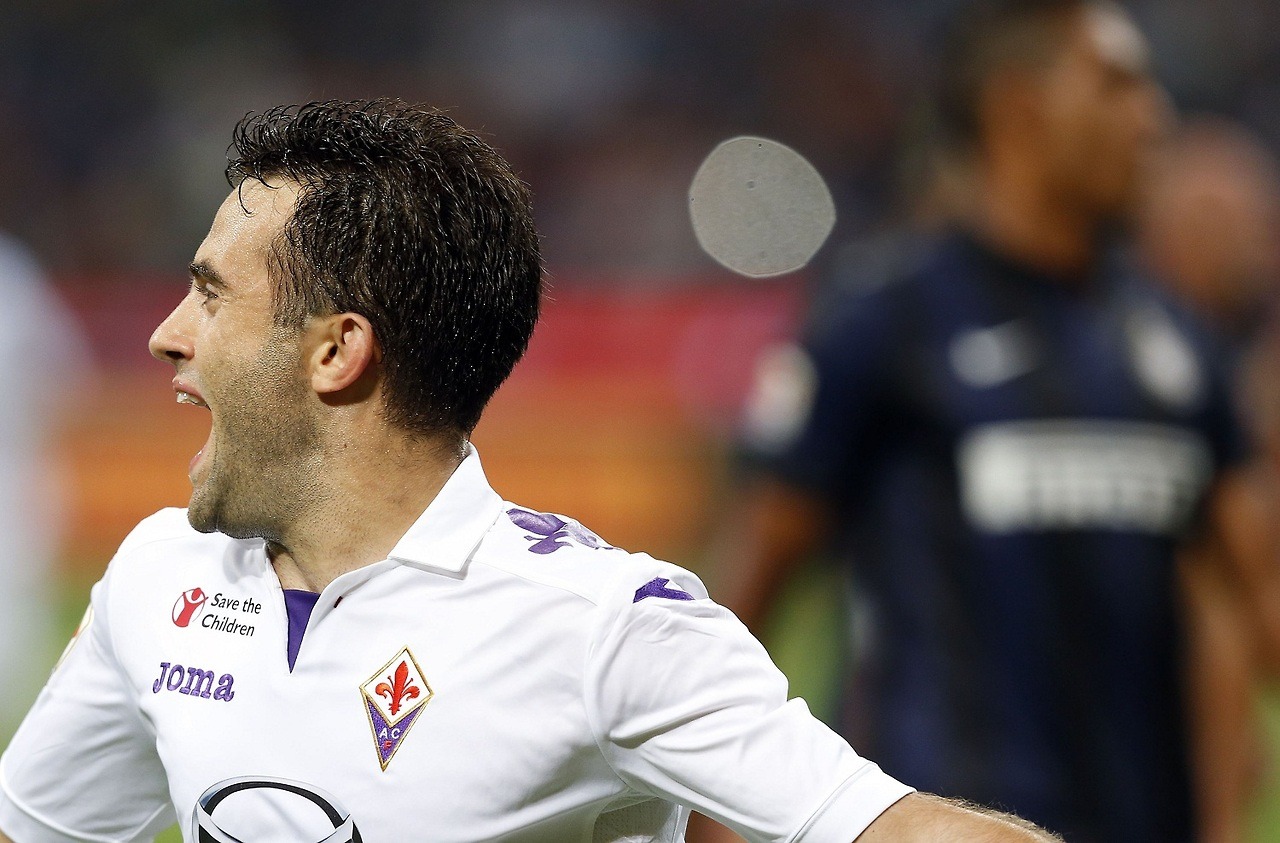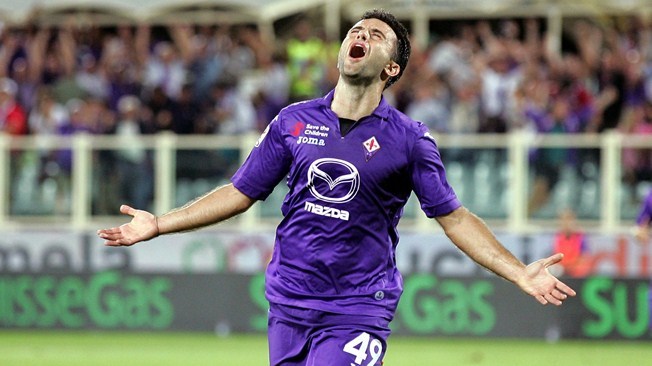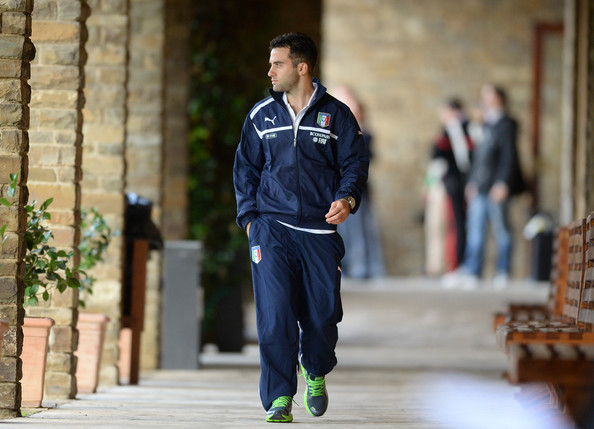Giuseppe Rossi’s Resurgence in Florence
Giuseppe Rossi’s Resurgence in Florence

Giuseppe Rossi’s Resurgence in Florence
By Will Giles
Some goals are so majestic in their execution, so unfathomably brilliant, that they develop a cult following of people liable to get a bit emotional whenever they recall them - think of that Zidane volley in the Champions League final against Bayer Leverkusen, or Dennis Bergkamp taking possibly the greatest first touch of all time before scoring against Argentina in the 1998 World Cup. Others inspire devotion due to their significance - such was the magnitude of David Beckham scoring the most Beckham-esque free kick in the last minute against Greece that a generation of England fans are probably still unable to articulate just how much they love that goal.
There are also those that may be nothing more than a scuffed shot that bobbled past a defender on the line. However, what these goals lack in breathtaking glamour, they make up for in the personal redemption they provide, meaning more to the individual scorer than any wonderstrike or 90th minute equaliser ever could. For a goal of this type, read Giuseppe Rossi’s bobbling, side-footed finish against Catania, a strike that completed his comeback from the death of a parent and 14 months of injury and torment.
An authentic Jersey boy born to Italian migrants, Rossi’s footballing life began amongst people who preferred to call it ‘soccer,’ and who favoured catching practice over a kickaround. But with both a love and an aptitude for the beautiful game fostered by his father-cum-high school coach, Rossi found himself leaving home at 13-years old in order to play for Parma’s youth team.
Nicknamed “The American” by his new peers, Rossi quickly demonstrated a level of footballing talent not always associated with those from across the pond. In fact, so impressive was the slight striker’s four year spell in Italy that Manchester United came calling, and it was hardly an opportunity that the young striker could turn down. Perhaps aided by the fact that he already spoke English, Rossi quickly made a name for himself at United by impressing at various levels, scoring thirty times for the reserve team, and on his Premier League debut against Sunderland. Indeed, Sir Alex himself was sufficiently enthused by the quality of Rossi’s performances to state in 2006 that the young forward ‘represents the future of the club.’
However, Rossi found his first team opportunities limited by the presence of, among others, Ruud van Nistlerooy, Ole Gunnar Solskjaer and Wayne Rooney, and went out on two separate loan spells in search of the game time that is so essential to any developing player. The first, at Newcastle United, was largely unsuccessful, as Rossi only managed a single goal in the first half of the 2006/07 season. For the remainder of the campaign, Rossi returned to Parma, and it was here that ‘Pepito’ would really begin to showcase his considerable talents.
Rossi scored nine goals in 19 games, and his contributions went some way to ensuring that the Italian club avoided relegation to Serie B, albeit on the final day of the season. Keenly aware that the forward’s goalscoring exploits had not gone unnoticed across Europe, Ferguson attempted to keep hold of the then-20 year old by promising him more chances in the first team should he stay at United. With three years left on his contract, it is perhaps fair to say that the easy option for Rossi would have been to remain at Old Trafford. However, after the arrival of Carlos Tevez in the summer of 2007, Rossi forwent his status as a player at one of the most illustrious clubs in the world in order to nail down a secure starting berth elsewhere, a decision that highlighted the striker’s simple desire to play football.
Spanish side Villarreal won the race to agree a deal for the American born Italian, and at £6.7million Rossi would prove to be a real bargain for ‘The Yellow Submarine.’ Signed as a replacement for Diego Forlan, Rossi quickly reduced the impact of the Uruguayan’s absence by scoring 11 goals in his first season, helping Villarreal to a second-placed finish. Indeed, Rossi’s potent start was a sign of things to come, as he would go on to score 82 times in 192 games during his time at El Madrigal, with 32 of these goals coming during a sublime season for the forward in 2010-11.
Rossi was certainly enjoying the most prosperous spell of his career, and the success he was experiencing in Spain was also augmented by international recognition - whilst at Villarreal, Rossi would score for the Italian national team in the 2008 Olympics, 2009 Confederations Cup and the Euro 2012 qualifiers. Perhaps the most accurate indicator of Rossi’s playing level, however, was the rife speculation that he would be joining Barcelona in the summer of 2011.
At this point, with Rossi seemingly on the verge of embarking towards the most prestigious stage of his career, a brief glance at the path football had taken him on might suggest that the forward had avoided any real hardship on his way to stardom. In reality, it had been a path blighted by personal tragedy, and Rossi would also find it to be one paved with career-threatening misfortune.
In February 2010, Rossi lost his father, the man who had coached him as a schoolboy, moved with him to Parma and mentored him throughout his career. Indeed, Fernando Rossi played an integral role in his son’s development, and the loss of such a hugely influential figure would undoubtedly have affected Rossi in a personal capacity.
On the pitch, however, Rossi reacted in admirable fashion, as his eye-catching, 32-goal season began only six months after his father’s passing. That the 23 year old striker responded in this manner to such an emotional setback is further proof of his desire to be out on the pitch, which had itself engendered his moves away from both New Jersey and Manchester.
Unfortunately, the strength of this desire would undergo further testing. On October 26th 2011, in a match against Real Madrid, Rossi tore his anterior cruciate ligament, an injury which strikes dread into the hearts and knees of footballers across the globe. Many players are never the same again after suffering an ACL tear, and the recovery process requires approximately six months of rehabilitation.
The one slightly fortunate aspect of the injury was that it occurred early on in the season, which gave Rossi a fighting chance of getting fit in time for Euro 2012. However, so intent was the striker on making his first international tournament that he perhaps rushed his comeback and, in a training session on Friday the 13th of April, Rossi was unlucky enough to tear his ACL once more, not only ruling him out of Italy’s Euro 2012 campaign, but also for another 13 months.
In total, Rossi would go 82 weeks without playing a competitive match. However, despite having to deal with the possibility of a premature end to his career on a near daily basis, Rossi maintained a positive outlook, preferring instead to focus on what he was able to do when injured. Indeed, undergoing operations in America meant he was able to spend time in New Jersey with his family, and Rossi would also meet his girlfriend whilst back in the state that he calls home.
In fact, Rossi himself maintains that he ‘never thought about quitting football,’ and his unwavering conviction in the face of adversity would be rewarded. In January 2013, Villarreal agreed to sell their star striker to Fiorentina for £8.8million, a remarkable fee for a player who had been out of action for 11 months. Indeed, the Viola were taking a risk with the signing, as they had no absolute guarantee that Rossi would actually be able to play football again.
However, by the 26th August 2013, the Florentine side would have good reason to believe that their gamble would be a profitable one. Having come on as a substitute in the final game of the 2011-12 season, Rossi made his full debut at the start of the following campaign against Catania, and within 14 minutes had scored not only his first goal for the club, but also his first for 696 days.
Objectively, the goal was nothing special. But for Rossi, who celebrated it with his arms outstretched and head thrown back, it meant the world, and marked the beginning of the rest of his career.
News of Rossi’s comeback has been warmly greeted by Cesare Prandelli and, like many Azzurri fans, the Italian manager is doubtless intrigued by the possibility of pairing Rossi up with Mario Balotelli. In fact, having previously remarked that he and the national team were ‘waiting’ for the resurgent striker, the final round of World Cup qualifying gave Prandelli the opportunity to call on Rossi for the first time in two years.
As far as Rossi is concerned, however, the time for waiting is over. Indeed, with five goals in six games so far this season, he’s clearly looking to make up for lost time, a notion which should unsettle Serie A and international defences alike.
This piece was written by Will Giles, a regular contributor at AFR. You can follow him on Twitter @William_Giles. Comments below please.









